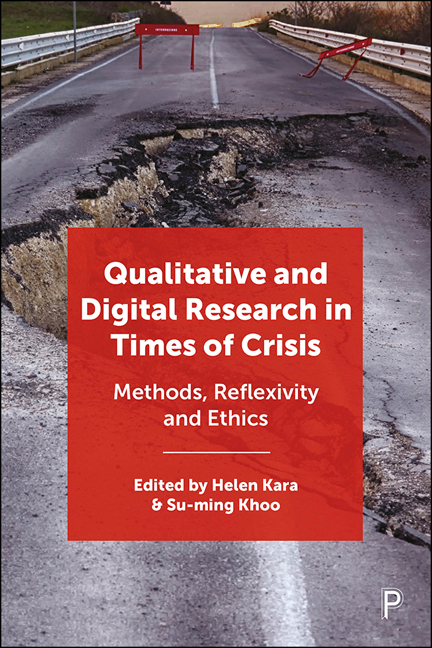1 - Just because you can, doesn’t mean you should
Published online by Cambridge University Press: 13 May 2022
Summary
Introduction
This chapter concerns how we navigate the decision-making process in research: how do we decide to do research or not in a time of, or in response to, an external crisis? It is a questioning process, drawing from reflexive approaches in different disciplines. Concerned principally with research of contemporary practices, it challenges the researcher to consider whether action is better than inaction; speed better than contemplation; and to what end and for whose purpose she pursues research.
In the 1990s, working as a young theatre producer, I attended a workshop on time and task management which proposed a mantra to ‘do less, better’. In 2020, at a loss for how to proceed, I tried to consider what such ‘doing’ would be, what constituted ‘better’, who might gain or lose by doing ‘less’. I formulated a reflexive questioning strategy built around time, purpose, and legitimacy for my research decision-making, offered here. This enabled me to sift through perceived usefulness, conflicting needs and demands, actual beneficiary impact or the notional ‘impact’ pursued by the neoliberal academy (Belfiore, 2015).
To start. All research is an act of decision-making
To choose to give this time at this particular time to this topic in this way is both multiple decisions and one. How we disseminate research – to publish, to collaborate, to protest – is a decision of how and with whom we ‘share knowledge’ (Smith, 2012). Our decisions are shaped by a range of influences: our social position, political motivations, our relationship to the field we research (Berger, 2015). As I write, I reflect on intersections between our personal and working selves in our research motivations. Which bit of my self is ‘doing’ research? I wonder which bit of my research decision-making is pulled by, and pushing back at, the institutional drivers to ‘perform’ our research in the ‘right’ way at the ‘right’ time in the carelessness and silo-ed branding of academia (Lynch, 2010; Tähtinen et al, 2016; Blackmore, 2020).
All research is decision-making in which the researcher makes implicit and explicit choices informed by pre-articulated values and processes
We form toolkits for thinking which we adapt as our research life advances. I deliberately avoid the term ‘career’. Having had multiple ‘careers’, I no longer believe my working life is in any way as linear as the term suggests.
- Type
- Chapter
- Information
- Qualitative and Digital Research in Times of CrisisMethods, Reflexivity and Ethics, pp. 17 - 29Publisher: Bristol University PressPrint publication year: 2021

